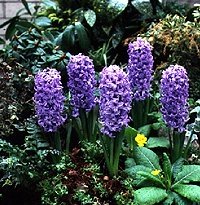|
 |
ADVERTISEMENT... |
 |
|
|

|
FLOWERS IN GREEK MYTHOLOGY |
Valentine.gr |
|
|
Hyacinthus-hyacinth
A
handsome Spartan youth loved by both Apollo, god of the sun, and Zephyrus, god of the west wind. Both gods competed to gain this handsome youth’s
attention. One day, as Apollo was teaching the young man how to throw the discus, the god accidentally killed Hyacinthus. According to another
legend, Zephyrus was jealous of the youth's love for Apollo and blew upon the discus,causing it to strike

|
|
Hyacinthus and kill
him. The truth is that the hyacinth mentioned in this myth is
most probably not what we call hyacinths today, as the
“modern” hyacinth is not native to Greece. In fact, the myth
may not even be the true source of the word "hyacinth,"
as it has been traced back to even more distant antiquity; a non-Greek
language spoken some 4,000 years ago, called 'Thracopelasgian.'
|
|
 Narcissus-narcotic Narcissus-narcotic
This
famous, flower inspired myth is perhaps more suited to the beauty
of the narcissus. Narcissus
was an exceptionally handsome young man. His mother had told him
that he would live a long life if he did not look upon his own
beauty. Narcissus however,decided to see his reflection on the
surface of the water coming from a spring. He was so enchanted by his own beauty that he remained
there, still, admiring his image until he died by the side of the spring. According
to another version, he mistakenly thought that his own reflection
was the face of the nymph that inhabited the spring and he drowned
when we jumped into the water trying to catch her. The narcissus
flower supposedly grew at that spot
|
 Crocus-Snow crocus Crocus-Snow crocus
Crocus
was a friend of the Greek god Hermes. One day as the two friends
were playing, Hermes accidentally hit and killed his friend. A
small flower grew at the place of the accident. Three drops of
Crocus’ blood fell on the center of the flower and formed the
spots on this plant. The plant took the name crocus because of
this event. According to another
myth, Crocus was a young man who
transformed into a flower because of his unfulfilled love for a nymph called
Smilax. At the same time, Smilax transformed into a vine-plant (Smilax
aspera-Sarsparilla).
|
|

|
 |
ADVERTISEMENT... |
 |
|
|

|
